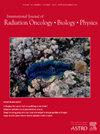接受放射治疗的脑转移患者认知能力下降的基线和时间依赖预测因素——对雅典娜试验的二次分析
IF 6.5
1区 医学
Q1 ONCOLOGY
International Journal of Radiation Oncology Biology Physics
Pub Date : 2025-10-14
DOI:10.1016/j.ijrobp.2025.08.037
引用次数: 0
摘要
目的/目的:与基线特征和随后的事件(如全身治疗给药、颅内进展和全身进展)相比,放疗对认知能力下降的影响程度尚不清楚。这项2期随机对照试验(NCT05503251)的二级分析旨在评估基线和时间依赖性临床和治疗特征对认知能力下降的影响。材料/方法:本研究计划对一项临床试验进行二次分析,在该试验中,脑转移患者以1:1的比例随机接受单独脑放射治疗或脑放射治疗并进行神经心理学评估和干预。先前的终点分析显示对照组和干预组在认知能力下降方面没有差异。收集以下基线特征:放疗类型(立体定向放疗与IMRT - WBRT), Karnofsky性能状态(KPS),性别,教育程度,原发肿瘤组织学,年龄,癌症诊断时脑转移,颅外疾病控制,颅外转移,脑转移数量,脑肿瘤体积,既往脑放疗,接受任何全身治疗,接受化疗。试验入组后接受全身治疗、颅内疾病状态、全身疾病状态和生存至少在试验入组后12个月进行评估。认知测试采用霍普金斯语言学习测验、对照口语单词联想测验和轨迹制作测验A/B。认知能力下降定义为使用可靠变化指数进行的至少一项评估的下降。采用Gray检验和Fine-Gray回归模型进行分析。在2022年8月至2024年6月期间,110名患者参加了ATHENA试验并符合分析条件。在单变量分析(UVA)中,只有KPS >;70 vs.≤70 (p = 0.044)可预测认知保存。脑肿瘤体积增大(p=0.044)、颅内进展(p=0.034)和全身进展(p = 0.005)可预测认知能力下降。在对UVA的四个重要变量进行多变量分析时,KPS >; 70与认知功能保持相关(p=0.011),而系统进展与认知功能下降相关(p=0.026)。结论对于接受放射治疗的脑转移患者,基线状态和全身进展可能比传统的影响因素(如放射类型、年龄、脑转移数量或全身治疗给药)更能预测认知能力下降。认知干预策略对于任何表现不佳或进展全身性疾病的患者都是必要的。这些发现将用多机构ATHENA联盟的数据进一步调查。本文章由计算机程序翻译,如有差异,请以英文原文为准。
Baseline and Time-Dependent Predictors of Cognitive Decline for Brain Metastasis Patients Treated with Radiotherapy– A Secondary Analysis of the ATHENA Trial
Purpose/Objective(s)
The extent to which radiotherapy contributes to cognitive decline, versus baseline characteristics and subsequent events such as systemic therapy administration, intracranial progression, and systemic progression, is unclear. This secondary analysis of a Phase 2 Randomized Controlled Trial (NCT05503251) aimed to evaluate the impact of baseline and time-dependent clinical and treatment characteristics on cognitive decline.
Materials/Methods
This is a planned secondary analysis of a clinical trial in which patients with brain metastases were randomized 1:1 to either brain radiation alone or brain radiation with neuropsychology evaluation and intervention. Previous endpoint analyses showed no difference in cognitive decline between control and intervention arm. The following baseline characteristics were collected: type of radiation (stereotactic radiosurgery versus IMRT WBRT), Karnofsky Performance Status (KPS), sex, education level, primary tumor histology, age, brain metastases at time of cancer diagnosis, extracranial disease control, extracranial metastases, number of brain metastases, brain tumor volume, previous brain radiation, receipt of any systemic therapy, and receipt of chemotherapy. Receipt of systemic therapy after trial enrollment, intracranial disease status, systemic disease status, and survival were evaluated for at least 12 months after trial enrollment. Cognition was measured by Hopkins Verbal Learning Test-Revised, Controlled Oral Word Association Test, and Trail Making Test A/B. Cognitive decline defined as a decline on at least one assessment using the reliable change index. Analyses were performed using Gray’s test and Fine-Gray regression model.
Results
Between August 2022 and June 2024, 110 patients were enrolled on the ATHENA Trial and eligible for analysis. On univariable analysis (UVA), only KPS >70 vs. ≤ 70 (p = 0.044) was predictive of cognitive preservation. Increased brain tumor volume (p=0.044), intracranial progression (p=0.034), and systemic progression (p = 0.005) were predictive of cognitive decline. On multivariable analysis of the four significant variables on UVA, KPS > 70 retained an association with cognitive preservation (p=0.011) and systemic progression retained an association with cognitive decline (p=0.026).
Conclusion
For brain metastases patients treated with radiotherapy, baseline performance status and systemic progression may be more predictive of cognitive decline than traditional implicating factors such as type of radiation, age, number of brain metastases, or systemic therapy administration. Cognitive intervention strategies for any patient with poor performance status or progressing systemic disease may be warranted. These findings will be further investigated with multi-institutional ATHENA Consortium data.
求助全文
通过发布文献求助,成功后即可免费获取论文全文。
去求助
来源期刊
CiteScore
11.00
自引率
7.10%
发文量
2538
审稿时长
6.6 weeks
期刊介绍:
International Journal of Radiation Oncology • Biology • Physics (IJROBP), known in the field as the Red Journal, publishes original laboratory and clinical investigations related to radiation oncology, radiation biology, medical physics, and both education and health policy as it relates to the field.
This journal has a particular interest in original contributions of the following types: prospective clinical trials, outcomes research, and large database interrogation. In addition, it seeks reports of high-impact innovations in single or combined modality treatment, tumor sensitization, normal tissue protection (including both precision avoidance and pharmacologic means), brachytherapy, particle irradiation, and cancer imaging. Technical advances related to dosimetry and conformal radiation treatment planning are of interest, as are basic science studies investigating tumor physiology and the molecular biology underlying cancer and normal tissue radiation response.

 求助内容:
求助内容: 应助结果提醒方式:
应助结果提醒方式:


